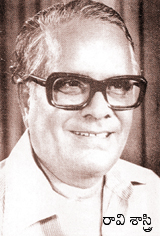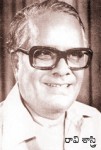Gangayya woke up early in the morning, took bath, put on ash patches on his body, the kumkum dot on his forehead, picked the machete and stepped outside into the street. He was facing the only problem—must earn the day’s wages, and fill his stomach. There was nothing more he would ask for. But then, that was the toughest problem. He set out to find a solution for that one problem.
He felt a little cold, since it was winter and he did not have enough clothes to cover his wrinkled body. Suddenly he recalled his past in one sweep.
He was sturdy in his younger days. No matter how cold it was, he would wake up at four in the morning and take a bath with cold water. He never felt this cold. After a clean bath, he would put on the ash stripes on his arms and chest, say his prayers, and walk into the street leisurely, twirling his moustache while his red silk upper garment wavering in the wind. If somebody stopped him on the street and asked him “to where”, he would say that he was going to work either in a factory or at a building site. He did not just say it; he worked and proved to the world that he meant what he said.
One time, he got into an argument showed it to his opponent by building the entire mansion of an attorney in the city single-handedly. He could finish alone the workload of four men. When he removed his shirt and sawed the porch plank as his body glistened in the sun with beads of sweat.. The sinews cracked like a bamboo stick. He made two or three rupees by the end of the day.
Stupid money. He made one rupee if held a machete and two if saw. When he planed, any type of wood shone like a mirror. “When I planed, you can see your shadow on the plank. That I would call workmanship. Workers nowadays can do nothing,” Gangayya told himself.
Why say all that? He was watching his own son work. He had only one son and that too after long time. Gangayya strived hard to make the boy the best carpenter among all the carpenters in the entire region. But his wife fussed over him and spoiled him. Idiot! The son turned wicked. Mother started harassing; claimed the boy would come to his senses after marriage. So, Gangayya performed the son’s wedding. Right away, the son moved out with his wife. The old woman [mother] lost her sight as if she could not watch her son wandering away.
Now, Gangayya’s body was wrinkled and all the strength in it gone. His sight was failing too. It was getting harder and harder to live. The old woman was lucky; went away quickly. The son, on whom he pinned his hopes, was no good anymore; nobody to count on. He was lonely. For him, it would be enough if he could earn a quarter or a half-rupee. And even to earn that became hard.
Gangayya set his machete on his shoulder, and arrived at the Rama mandir, which stands at the four-way junction of the town. He turned towards the lord in the temple and said his prayers.
Just then, he saw Venkadu. He was skinny and tall, like the vegetable, drumstick. One could easily recognize him as Venkadu, even from distance. Gangayya pretended not to see him and took a turn and walked hastily. But then, Venkadu caught up with him, and seized Gangayya’s arm from behind.
“What is the matter, Gangayya? You’re avoiding me. Don’t you think you should repay the money you’d borrowed from me? Planning to call it off or what?”
“I’ll settle it, you fool! You stop me in the middle of the street for that tiny bit of a loan? What kind of a gentleman are you?”
“You mean whom? You or me? You came to me, begged me for that tiny bit of loan. If it is such a small bit, why don’t you give it back to me? Tiny bit, he says! Ha, tiny bit. Did I get it freely? Come on, pay it up,” Venkadu raised rumpus. Poor Venkadu was not a bad person. Who would want to throw away money though! “This is going on long enough. Put away your games, they don’t fly with me,” he said and snatched the machete from Gangayya’s shoulder.
“Nayanaa, nayanaa. God bless you, please, let it go. If you take my machete, how can make money? I promise, I will bring your money by dusk,” Gangayya begged him,
A few people gathered to watch the bickering. They all felt sorry for Gangayya.
“What does he have to give? Why hold him?” said one man to Venkadu.
“No? What do you mean he does not have? He has to sit in the club and drink tea,” said Venkadu.
Sometimes Gangadu would sit in the club on the street leading to the city and pay one anna for a cup of tea. He did that when he had no money for rice. But for many people in the town, sitting in the club and drinking tea was a pastime. Gangayya did not like telling them that he was drinking tea only because he had no rice to eat. He implored again that somehow he would manage to settle the debt by evening, and for now Venkadu should let go of his machete. The people who gathered around got them to an agreement. Gangayya would get back to Venkadu with money by evening, and Venkadu would let go Gangayya for now.
Gangayya started to walk with his machete on his shoulder again. He must earn one quarter of a rupee today and pay back the loan. How could he get a work for one quarter in this stupid town? There were only four Brahmin homes, two or three homes of kshatriya, and business communities. Rest of the families belonged to kapu, golla, weavers, goldsmith, washer, haircutter, mala, and madiga castes. What kind of work they would have to pay a carpenter and get the job done? They were struggling for food themselves. How could they help others? Let’s say he would go to a kshatriya home. What could he find there? Their houses were big, no question. But they lost all their assets and they were barely making it themselves. All those mansions were disappearing fast enough and they were living discreetly. The tiles were falling off from the roofs. And the walls were cracking, causing plants to grow from the cracks. Alas, that was their state of affairs. The only hope was in the Brahmin homes. There is proverb: Go to the Brahmin’s colony, if you have nothing else to do. They could give a chore anybody who appeared at their door. They would want you to work for them but squirm to pay though. If you beseech, they might give you food or gruel. But Gangayya needed some money to pay off the debt and some more to fill his stomach. Today he must earn two quarters, but how could he? Obviously, it would not possible in this town. He should go to the city, which was three miles from his town. Would it be possible for him to walk three miles, work there and bring back his earnings? It was already quite late in the day. He told himself to go to the Brahmin homes and try first and proceeded.
He could find no work in the first three homes. He went to the fourth house. He felt the winter sun prickly on his skin. Gangayya was exhausted. He squatted on a nearby patio, hoping to rest for a while. His stomach was empty since last night. He was hungry. Gangayya could not think straight. There was no thought, none whatsoever in his head. Whenever he thought, he thought only about himself. There was blistering fire in his stomach. He should put something in it. That was all he was thinking—the only thought on his mind. Nothing else mattered to him.
At a distance, a few people gathered under a neem tree. Nothing in particular. A sheep was slaughtered. That was it. They peeled off the skin, and hung from the tree within their reach, sliced the meat and doled out their portions. Each one of them took their share of raw meat in a banyan leaf and was on their way home. One of them took the head and another man its legs. The tanner came to take the skin and begged for a bit of the meat. Gangayya kept watching the scene keenly. It was quite sometime since he had a taste of meat. One must eat the sheep’s meat! What a taste! His mouth watered. The meat distribution came to an end after ten minutes. All of them were gone.
Gangayya got up, and slowly went into the house and stood in the hallway. Somebody was sleeping in the bedroom on the west side.
“Amma, Narasamma garu!” Gangayya called. Narasamma was in the kitchen. She did not come out but Kantamma, the daughter-in-law, came from the next room.
“Gangayya, you are here, for any reason in particular?” she asked, as she sat down on a cot in the sun and started unbraiding her hair.
“Nothing in particular, Amma. Wondering if you have any job for me?” Gangayya said, came into the room past the hallway, and sat down.
“Oh, no. We don’t have any work in our house. Did you not go to other places?”
“No, amma. I did not go anywhere. Nothing to do since yesterday. Tell me, amma, if there is anything to be done. I will do it.”
“No, nothing to do in our house.”
“What do you mean? Why say no work. Please, call the old lady. You may not know,” Gangayya said, scrutinizing the cots in the yard, just in case any of them needs fixing. He told himself, “There are four young boys in the house. Not one of them breaks a cot.”
“Amma, Narasamma garu!” he called again. Narasamma came from the west side room. She was her daughter-in-law sitting in the sun and said, “What is that, Amma, sitting in the yard? Winter sun is not good for the body. Go, sit in the porch.”
Kantamma stood up and went into the porch.
“Gangayya, what is new, you came here?” Narasamma asked.
“Nothing, Amma. Please, let me have a sip of coffee,” Gangayya said, leaning on the pillar. Hunger was chewing him up.
“That is good, naayanaa, coffee at this time of the day? We are done eating dinner,” Narasamma said.
“Are you crazy, Gangayya? How can we have coffee at this hour?” Kantamma said, staring at the hair that stuck to the comb. Then she said to her mother-in-law, “Look, Attayyaa, how I am losing hair.”
“Yes, you are not taking care of it. You are just three weeks pregnant. And you are already everything as you please. Don’t you have to eat proper food? Don’t you have to take care of your body? You know you are not a child,” Narasamma reprimanded her.
Kantamma did not understand the relevance between falling hair and eating right but kept quiet.
Gangayya was dozing. He thought, “These people are worried about losing hair while here I am losing my life. Stupid hair. Who cares if it is gone. Why not let it go, saves oil at least.
Narasamma looked at him. “Probably the fool is hungry,” she said to Kantamma.
Kantamma laughed.
“Gangayya, Gangayya,” Narasamma called.
“What? Coffee?” Narasayya woke with a jerk.
“No, no coffee. There is some leftover rice. Want to eat?”
“Ccha. What kind of question is that? Up until now, in all my life, I never had even sip water except in the house of my own caste. I am from a man of my caste. How could you suggest that I eat yesterday’s gruel in your house?”
“Enough of that confounding caste. Come over to the backyard. Sit by the well and eat. Nobody is going to know about it,” Narasamma said.
Kantamma laughed aloud. “Why wouldn’t eat, Atta. In this village, they all eat even meat, I heard.”
“Ccha, I swear on Veerabrahmam, Amma. Maybe some casteless idiots ate but you cannot say the same about everybody. Nice way to say that.”
“That’s fine. I will give you a job. Finish it, and eat and lie down on the porch,” Narasamma said.
“Good. Tell me, what is it?” he picked up the mettele.
“Oh, no. Nothing to do with mettele. Day after tomorrow we are going to have the naming ceremony for our baby.
“Do you want me to make a cradle? Any baby, who sleeps in the cradle I had made, will become a great man. All the children of the inspector in the city slept only in the cradle I had made for them. See how great they had become—one of them is a lawyer, another tahsildar, and yet another is in some very big job. That sweet mother says even now that ‘Ganga, it is all in your blessed wrist.’ When one works, the wages are not going to stay for ever but the name does.”
“We don’t need any such work at this point. There is a little job. Can you do it?”
“Tell me, amma. For an expert, no job is impossible.”
“Day after tomorrow, we are going to have barasala for our grandchild. Pick a few coconuts from the tree.”
“What? You want me to climb a coconut tree? I can’t. You will have to call the tree-climber.”
“Nayaanaa, nayannaa, please, do me this favor. That idiot has gone to his mother-in-law’s home. He will not be back for another ten days, I was told.”
“Amma, you are asking me to climb a tree. That is not my vocation.”
“Babuu, babuu, I will pay you two annas. Monkeys are ravaging the fruits. And the naming ceremony is coming up in two days.”
Gangayya was tempted. A bowl of rice would fill the belly nicely. It would taste great with a pickle on the side. A wad of meal now would help him to go even without water for rest of the day. The old woman also promised two annas cash. That would get him a cup of tea tonight and the next day as well. Oh, no. What about Venkadu’s loan? Well, he would worry about it later, after receiving the two annas from the old woman.
“Okay, amma. Let me have a wad of rice.”
“Why don’t you first pick a bunch of coconuts? You can eat later. If you eat now, you will lie down and rest. After that, no way you would pick the fruits. After all, it is only a five-minute job,” Narasamma piqued him. She thought, “Yes, of course, I would have to be strict with him. Or else, the idiot would not go up the tree. On needs to be skillful in getting work done by idiots like him.”
“At least, let me have a little buttermilk,” Gangayya said.
Narasamma went in, returned with a can of buttermilk and poured into his glass. Gangayya finished the pot of buttermilk, burped loudly, went into the backyard and stood under the coconut tree. The tree was tall, and smooth like a pillar. “To hell with this tree. See how tall it is,” he told himself. Gangayya never accepted defeated when it came to job on hand. He had lot of trust in his own abilities.
He put on the rope on his feet and the waist, and started climbing the tree. He put the ax on his shoulder since he did not have the right kind of knife to cut the coconuts. He was not used to this kind of work. It was hard at first. But there is nothing impossible for those who are stubborn. He reached the top and cut a few fruits.
Narasamma, waiting on the ground, picked them and put them in a basket. And then, she shouted, “these are enough. Come down.”
Gangayya was exhausted. He was thirsty. He stopped for a split second and looked around. He could see the entire village. He could see the fields and silos at a distance. Farmers, sitting on the lakeshore, were eating gruel. Gangayya remembered the warm food and pickles. That was it. His eyes went dark. He could see nothing—the village, the fields, silos, nothing. He screamed, “Oh, ammaa!”
His head rested on the rock on the ground. His face was peaceful. He did not let go of the ax in his hand. Gangayya died. However, Gangayya was a creator. What is death after all for a creator?
[End]
(The Telugu original has been published in bharati monthly, April 1953.
Translated by Nidadasvolu Malathi and published on thulika.net, April 2009)











